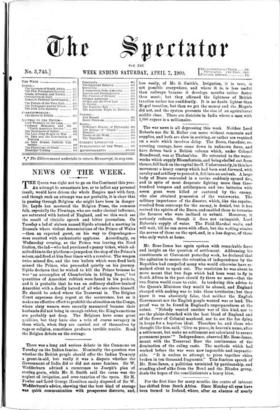Mr. Rose - Innes has again spoken with remarkable force and insight
on the question of settlement. Addressing his constituents at Claremont yesterday week, he declared that the agitation to secure the retention of independence by the Republics bad compelled many who would otherwise have re- mained silent to speak out. The resolution he was about to move meant that two flags which had been wont to fly in South Africa in the past should fly there no more—that the two States would cease to exist. In tendering this advice to the Queen's Ministers they would be abused, and England charged with making war to take those territories; but they knew it was absolutely false, that neither the English Government nor the English people wanted war or land. The proof was to be found in England's unpreparedness at the outset. "Nobody wanted another war of this kind, nor to see the plains drenched with the best blood of England and of the flower of Colonial manhood, nor to see the foe dying in heaps for a hopeless ideal. Therefore be, and those who thought like him, said, ' Give us peace, in heaven's name, after a settlement, but make no settlement not calculated to secure permanent peace: " Independence, observed Mr. Rose-Innes, meant with the Transvaal Boer the continuance of the domination of the ruling caste. The methods which had worked before the war were now impossible and impractic- able. " It is useless to attempt to piece together china broken in ten thousand fragments." This fearless speech of Mr. Rose-Innes, a politician untainted by partisanship, and standing aloof alike from the Bond and the Rhodes group, deals the hopes of the conciliationista a heavy blow.






































